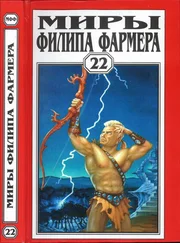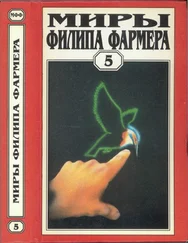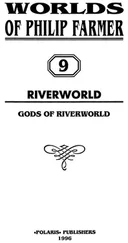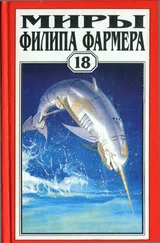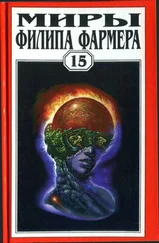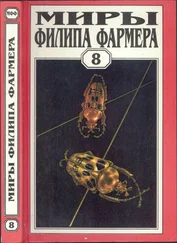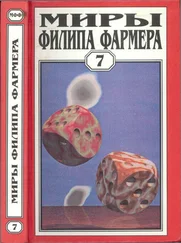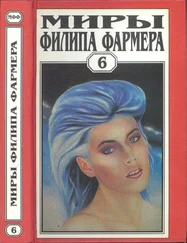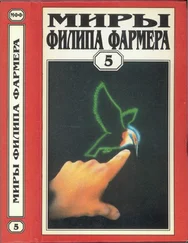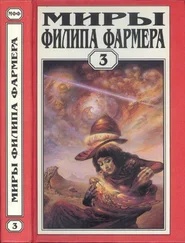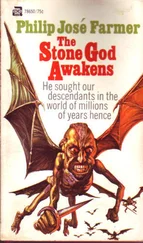Филип Фармер - The Lovers
Здесь есть возможность читать онлайн «Филип Фармер - The Lovers» весь текст электронной книги совершенно бесплатно (целиком полную версию без сокращений). В некоторых случаях можно слушать аудио, скачать через торрент в формате fb2 и присутствует краткое содержание. Жанр: Фантастика и фэнтези, на английском языке. Описание произведения, (предисловие) а так же отзывы посетителей доступны на портале библиотеки ЛибКат.
- Название:The Lovers
- Автор:
- Жанр:
- Год:неизвестен
- ISBN:нет данных
- Рейтинг книги:5 / 5. Голосов: 1
-
Избранное:Добавить в избранное
- Отзывы:
-
Ваша оценка:
- 100
- 1
- 2
- 3
- 4
- 5
The Lovers: краткое содержание, описание и аннотация
Предлагаем к чтению аннотацию, описание, краткое содержание или предисловие (зависит от того, что написал сам автор книги «The Lovers»). Если вы не нашли необходимую информацию о книге — напишите в комментариях, мы постараемся отыскать её.
The Lovers — читать онлайн бесплатно полную книгу (весь текст) целиком
Ниже представлен текст книги, разбитый по страницам. Система сохранения места последней прочитанной страницы, позволяет с удобством читать онлайн бесплатно книгу «The Lovers», без необходимости каждый раз заново искать на чём Вы остановились. Поставьте закладку, и сможете в любой момент перейти на страницу, на которой закончили чтение.
Интервал:
Закладка:
'Hal, I can't help it if you go along so easily with unreality! I don't like what I have to do, but it's my duty! You're even making a misstep by reproaching me for what I have to do. Another black mark–'
'Which you will be forced to repeat to the gapt. Yes, I know. Let's not go into that again for the ten thousandth time.'
'You brought it up,' she said righteously.
'That seems to be all we have to talk about.'
She gasped, and then she said, 'It wasn't always that way.'
'No, not for the first year of our marriage. But since then–'
'Whose fault is that?' she cried.
'That's a good question. But I don't think we should go into it. It might be dangerous.'
'What do you mean?'
'I don't care to discuss it.'
He was himself surprised at what he had said. What did he mean? He did not know; he had spoken, not with his intellect but with his whole being. Had the Backrunner in him made him say that?
'Let's get to sleep,' he said. 'Tomorrow changes the face of reality.'
'Not before–' she said.
'Before what?' he replied wearily.
'Don't play shib with me,' she said. 'This is what started the whole thing. You trying to... put off your... duty.'
'My duty,' said Hal. 'The shib thing to do. Of course.'
'Don't talk like that,' she said. 'I don't want you to do it just because it's your duty. I want you to do it because you love me, as you are enjoined to do. Also, because you want to love me.'
'I am enjoined to love all of mankind,' said Hal. 'But I notice that I am expressly forbidden to perform my duty with anyone but my realistically bound wife.'
Mary was so shocked that she could not reply, and she turned her back to him. But he, knowing that he was doing it as much to punish her and himself as doing what he should, reached out for her. From then on, having made the formal opening statement, everything was ritualized. This time, unlike some times in the past, everything was executed step by step, the words and actions, as specified by the Forerunner in The Western Talmud. Except for one detail: Hal was still wearing his dayclothes. This, he had decided, could be forgiven, for it was the spirit, not the letter, that counted, and what was the difference whether he wore the thick street garments or the bulky nightclothes? Mary, if she had noticed the error, had said nothing about it.
Afterward, lying on his back, staring into the darkness, Hal thought as he had many a time before. What was it that cut through his abdomen like a broad, thick steel plate and seemed to sever his torso from his hips? He was excited, in the beginning. He knew he must be because his heart beat fast, he breathed hard. Yet, he could not- really-feel anything. And when the moment came- which the Forerunner called the time of generation of potentiality, the fulfillment and actualization of reality – Hal experienced only a mechanical reaction. His body carried out its prescribed function, but he felt nothing of that ecstasy which the Forerunner had described so vividly. A zone of unfeeling, a nerve-chilling area, a steel plate, cut through him. He felt nothing except the jerk-ings of his body, as if an electrical needle were stimulating his nerves at the same time it numbed them.
This was wrong, he told himself. Or was it? Could it be that the Forerunner was mistaken? After all, the Forerunner was a man superior to the rest of humanity. Perhaps, he had been gifted enough to experience such exquisite reactions and had not realized that the remainder of mankind did not share his good fortune.
But no, that could not be, if it were true – and perish the thought that it could not be – that the Forerunner could see into every man's mind.
Then, Hal himself was lacking, he alone of all the disciples of the Real Sturch.
Or was he alone? He had never discussed his feelings with anyone. To do so was – if not unthinkable – undoable. It was obscene, unrealistic. He had never been told by his teachers not to discuss the matter; they had not had to tell him, for Hal knew without being told.
Yet, the Forerunner had described what his reactions should be.
Or had he done so directly? When Hal considered that section of The Western Talmud which was read only by engaged and married couples, he saw that the Forerunner had not actually depicted a physical state. His language had been poetical (Hal knew what poetical meant, for as a linguist, he had access to various works of literature forbidden to others), metaphorical, even metaphysical. Couched in terms which, analyzed, were seen to have little relation to reality.
Forgive me, Forerunner, thought Hal. I meant that your words were not a scientific description of the actual electrochemical processes of the human nervous system. Of course, they apply directly on a higher level, for reality has many planes of phenomena.
Subrealistic, realistic, pseudorealistic, surrealistic, superrealistic, retrorealistic.
No time for theology, he thought, no wish to make my mind whirl again tonight as on many nights with the unsolvable, unanswerable. The Forerunner knew, but I can't.
All he knew now was that he was not in phase with the world line; had not been, possibly never would be. He teetered on the brink of unreality every waking moment. And that was not good – the Backrunner would get him, he'd fall into the Forerunner's brother's evil hands...
Hal Yarrow woke suddenly as the morning clarion rang through the apartment. For a moment, he was confused, the world of his dream meshing with his waking world.
Then, he rolled out of bed and stood up, looking down at Mary. She, as always, slept on through the first call, loud as it was, because it was not for her. In fifteen minutes, the second blast of bugles over the tridi would come, the women's call. By then he must be washed, shaved, dressed, and on his way. Mary would have fifteen minutes to get herself on the road; ten minutes later, the Olaf Marconis would enter from their night's work and prepare to sleep and live in this narrow world until the Yarrows returned.
Hal was even quicker than usual because he still wore his dayclothes. He relieved himself, washed his face and hands, rubbed cream over his face stubble, wiped off the loosened hairs (someday, if he ever rose to the rank of a hierarch, he would wear a beard, like Sigmen), combed his hair, and he was out of the unmentionable.
After stuffing the letters he'd received the previous night into his traveling bag, he started toward the door. Then, impelled by an unexpected and unanalyzable feeling, he turned and went back to the bed and stooped over to kiss Mary. She did not wake up, and he felt regret – for a second – because she had not known what he had done. This act was no duty, no requirement. It had come from the dark depths, where there must also be light. Why had he done it? Last night, he had thought he hated her. Now...
She could not help doing what she did any more than he. That, of course, was no excuse. Every self was responsible for its own destiny; if anything good or bad happened to a self, then only one person had caused that happening.
He amended his thought. He and Mary were the generators of their own misery. But not consciously so. Their bright selves did not want their love to be wrecked; it was their dark selves – the deep-down, crouching, horrible Backrunner in them – that was causing this.
Then, as he stood by the doorway, he saw Mary open her eyes and look, somewhat confusedly, at him. And, instead of returning to kiss her again, he hastily stepped into the hallway. He was in a panic, fearing that she might call him back and begin the whole dreary and nerve-racking scene again. Not until later did he realize that he had not had a chance to tell Mary that he would be on his way to Tahiti that very morning. Oh well, he was spared another scene.
Читать дальшеИнтервал:
Закладка:
Похожие книги на «The Lovers»
Представляем Вашему вниманию похожие книги на «The Lovers» списком для выбора. Мы отобрали схожую по названию и смыслу литературу в надежде предоставить читателям больше вариантов отыскать новые, интересные, ещё непрочитанные произведения.
Обсуждение, отзывы о книге «The Lovers» и просто собственные мнения читателей. Оставьте ваши комментарии, напишите, что Вы думаете о произведении, его смысле или главных героях. Укажите что конкретно понравилось, а что нет, и почему Вы так считаете.

